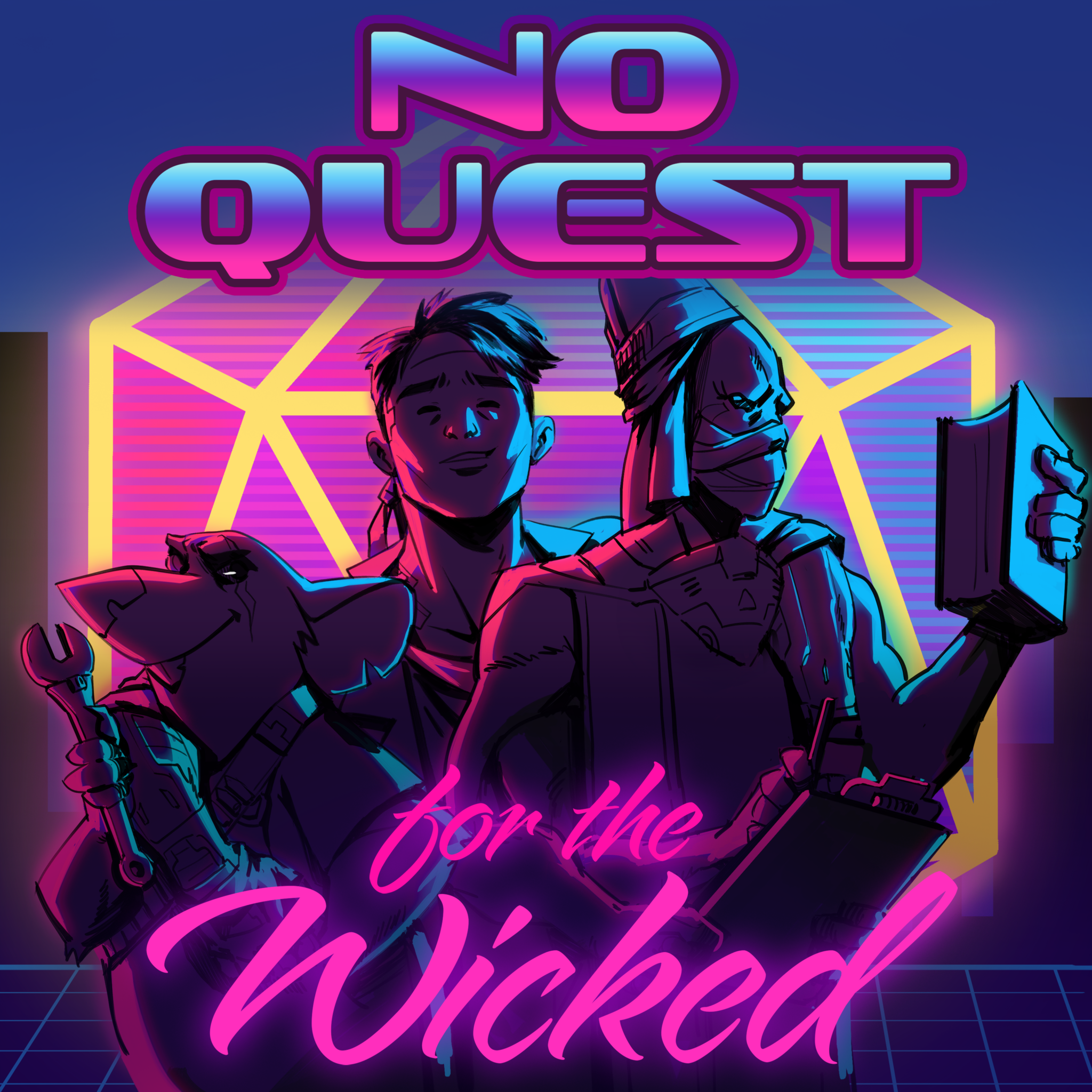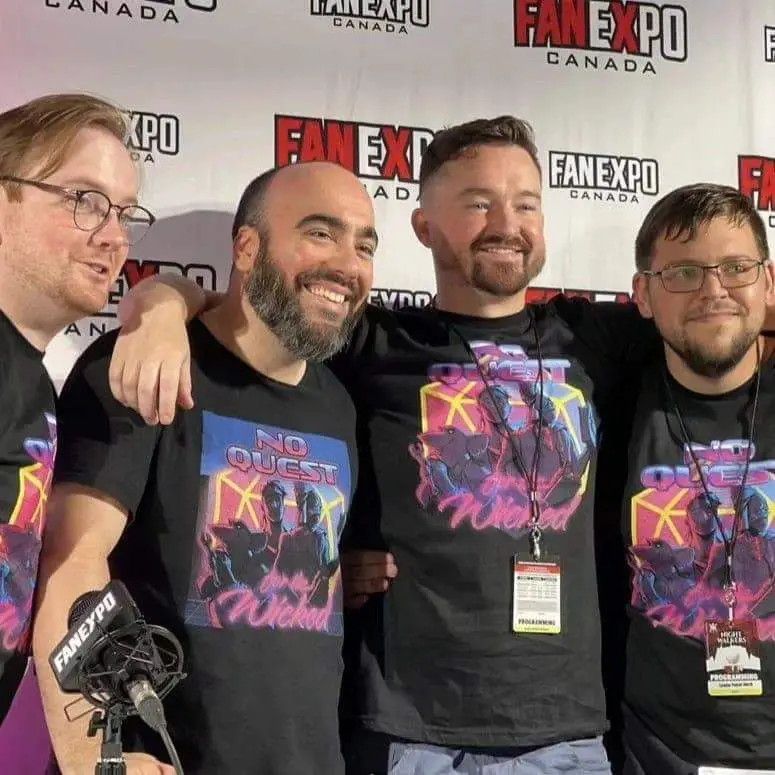Offscreen is a series where I interview game masters of various actual plays to discuss the crunch craft differences between running a home game and running an actual play.
Today’s episode features Dane Miller. Dane is the GM of No Quest for the Wicked, a story-driven actual play using Paizo’s sci-fi space opera system Starfinder in a homebrew setting. No Quest for the Wicked received three Audioverse awards for Best Player Direction, Player, and New Improvised Show, as well Best Villain at the Crit Awards.

This interview is a bit of a departure from the previous two in some ways, as we move from the traditional, long form, expediential style of actual play that Devil’s in the Dice and NPC Inc. fall under. No Quest for the Wicked is a shorter form AP that leans more on its creators cinematic background, with episodes lasting 60-90 minute a piece.
Dain and I walked through why Actual Play’s low barrier to entry is appealing for independent creatives, how to maintain pacing for shorter episodes, and how to create a creative space for players who don’t come from a performance background.
The following excerpt is from the full interview.

The first question I ask every guest I have on this show is why do you run games?
I went to school for acting. When I graduated, much like what’s happening now, there was a writer strike in America and there was an actor strike in Canada (where I’m from). I left college with all of my new acting knowledge and there was just nothing being made, so I ended up getting into making my own stuff with all of the actors that I had met through college. Like, cool, we’re all hungry, we all need work, and we all need stuff for our reels, so let’s make stuff.
The problem with that is: making movies is very expensive, especially if you want to do sci-fi and fantasy. When I first got introduced into TTRPGs, I was like, “Oh, I don’t have a budget for this and I don’t need one.” As long as I can use the right words and maybe the right music, I can transport people into a world that doesn’t require CGI or props and effects and all that stuff
I can run a space chase through a space station on a highway. I don’t have to worry about whether it’s going to look good or whether it’s going to break the budget. If I can think of it and I can get my players to invest in it, it’s going to work.
What do you believe is the job of the game master, both at home and on an actual play?
First and foremost, it’s facilitating fun. Right? I strongly believe that everyone in the world would enjoy playing a TTRPG of some sort if they play with the right people.
I learned very early on that you can prepare all you want. You can have the best story. You can have the best NPC voices and all that, but if everyone isn’t having fun, then there’s no point in doing it.
I think first and foremost, across like home games, actual plays, whatever; If people aren’t having fun, there’s no point. If you’re playing a home game and no one’s having fun, it’s like, why are you here? Like, why are you doing it?
And if you’re on an actual play and no one’s having fun, people are gonna hear that and not be invested. If you can’t get your players to invest, why would anyone take, you know, an hour or whatever to listen to an episode of people not having fun when there are so many great shows out there where people are having fun?
This is the third episode I’ve recorded and it keeps coming back to this idea of like, you need to have fun. You can have the best technical skills. You can have the most talented people, but if you’re not feeling it, that spark that people listen to actual plays and play TTRPGs for, if that’s not there, no one cares.
Dain: Yeah, that’s why I always tell people to listen to the Not Another D&D podcast. I think that’s one of the best examples of a really successful show where you can tell that they’re having a fucking blast playing it. They’re not just doing it because like we can make a podcast and make money or whatever, which I don’t think anyone’s ever said.
Whenever I talk about the big shows, I would send people more in that direction than I would ever send them in towards Critical Role. Because I feel like Critical Role is such a huge undertaking to just listen to one four-hour episode, whereas you could listen to the hour and a half or whatever the other shows are, and it’s people having the best time with their friends.

About pacing, especially with No Quest For The Wicked, you have very consumable, like one hour, hour and a half long episodes, as opposed to home games, which can run anywhere from three hours to I’ve been in 12 hour long sessions before. How do you as the GM manage that pacing for an actual play versus a home game?
Dain: It’s tough. It’s one of the things that I find the most difficult for a show because we like to also leave it on a cliffhanger every episode. Unless it’s sort of like the end of an arc where we can button it with like a nice moment of resolution, I try to always leave it on a like a big moment.
I try to work backwards. I try to figure out where I want the episode to end and the best way to get them there. Then I work backwards and I cut and add as I need. So I always have an extra encounter that isn’t really plot essential.
I can just take it out and no one will ever know. I try to work backwards and I try to over-prep as well. I have the beats roughly at the 30 minute mark and at the 45 minute mark and at the hour mark, roughly where they need to be in order for me to get where I’m trying to go.
Sometimes it works and sometimes it doesn’t. Really early on in the show, I had a car chase that was meant to be like a couple skill checks, and they just beefed it so hard. Like every roll was so bad and they were making stupid decisions.
This 15, 20 minute sequence ended up taking up the rest of the episode and like half of the next episode. It’s one of my favorite scenes in the show. This is a great flavor of what you’re going to get in this show. I’m going to let their dice rolls ride. If you beef it, you’re going to have to deal with those consequences. And I’m not going to flub whether or not you succeed or not.
I think, yeah, I think it’s important to let the dice be as they are and let it shape the show. And it definitely has. There have been some pretty gnarly 1’s and pretty great 20s in the show that I’ve had to be like, well, okay, back to the drawing board.
All my plans, they’re gone. I really also like the idea of working backwards. Especially coming from a film background, bringing that into the actual play space makes a lot of sense.
Dain: When you’re playing a home game (especially if you’re playing with maps and not doing theater of the mind) if you’re in a dungeon and you realize you’ve only made it like four rooms in, and you’re like, “We’re at the boss right now,” that’s weird.
But when we were doing Theater of the Mind, the guys don’t know how big the facility they’re in or the space station they’re in. They don’t know that the boss isn’t right there. All I have to do is sort of tailor the next room they walk into. It’s big and scary, or they’ve come across a big ornate gate, and it’s like, oh great, okay, we’ve come somewhere important. They have no idea I had four or five more rooms or challenges planned.
What advice would you give to someone who wants to start DMing at home or moving from home into actual play?
Dain: If you want to move into actual play, Invest in your gear. The better things sound, the more likely people are going to listen. There’s a lot of actual plays out there and there’s a lot of good actual plays out there. If you’re going to be throwing your hat in the ring, you need to be operating at like the highest level you possibly can.
You need to take editing very seriously. You need to think of it no longer as a game, but as a piece of media that is being consumed. Producing something that will be consumed hopefully by a lot of people, it needs to be the best product you can put out while still somehow maintaining the magic of your home game. I think if you’re not willing to do that, if you think it’s going to be as easy as sitting down and playing a game for two hours and then putting that up raw, I think you’re gonna have a very disheartening experience.
But if you’re looking to just get into DMing, I think the best thing to do is make sure that you’re playing with people you feel comfortable with. Find people that you feel comfortable with, find people that you feel safe with. I’m an extrovert, I will perform and do whatever, but there’s a level of nervousness of sitting down and being like, oh, I’m going to be a half-elf rogue for the next little bit, and I have to pretend like I’m not me. It’s a weird thing to do with your friends for the first time.
Then to be like, oh, I’m going to do that, but literally every other character as the DM. It elevates the experience so much if you commit to it. And I’m not saying you have to do voices. You’re not Matt Mercer. You’re not Brennan Lee Mulligan. Don’t hold yourself to those standards.
Your first session needs to be fun. Because at the end, there’s nothing there’s like that. DMing is finding your group and your people wherever that may be. Find your people wherever you can and however you can. Just make sure you’re playing with the right people. And if the first session doesn’t go great, don’t feel like you have to stick with it. IIf it’s toxic or if it doesn’t serve you, move on and try again. Don’t give up. Don’t think that’s how it’s going to be forever. I think those are the big things that you need to focus on.
The full interview is available here or wherever you listen to podcasts.
You can find Dan on twitter @thedainiac on Twitter. You can find No Quest for the Wicked on any podcasting app, @NoQuestCast on pretty much every social media, and noquestcast.com for links to everything.
Images via No Quest For The Wicked
Have strong thoughts about this piece you need to share? Or maybe there’s something else on your mind you’re wanting to talk about with fellow Fandomentals? Head on over to our Community server to join in the conversation!

